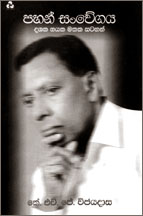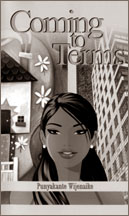|
observer |
|
|
|
|
|
OTHER LINKS |

|

|

|
|
|
|
This book being a digest of reminiscences running over six or seven decades one could read this as a fascinating novel, alluring autobiography or an illustrative socio economic study, whatever you may call it, it is indeed a book which can be read at one sitting.
Out of the 21 chapters, Ma bala kale My childhood, Damsal Sevana College days, Peradeni Sihiwatana Memories of Peradeniya University Guvan Viduli Vitti At Radio Ceylon, Oxford giya Kathawa Admission to Oxford, Videsha Charika Foreign travel are some of the chapters that would entice the reader, keeping him spellbound till the end.
The plain and lucid style employed makes effortless reading. They however, endear my heart for the simple reason that the places and the characters described therein are close to me too. I cannot but fail to reminisce my own childhood and the university days as well, for I myself have been only four years senior to Wijayadasa in the university.
Wijayadasa's journey to Oxford accompanied by his wife and how he pursued his post graduate studies is an interesting episode. Like every father, he too enthuses the admission of his only daughter to this distinguished seat of learning, where he himself had the fortune to pursue his post graduate studies.
Immediately after passing out of the Peradeniya University he started teaching in the faculty as it was customary for the best student to join the teaching staff. But soon afterwards in 1960 he had to leave the university to enter the prestigious Ceylon Civil Service, after obtaining an excellent pass at the competitive examination.
Radio Ceylon days is another interesting chapter, where Wijayadasa fondly narrates how, as the Director of the national service, he was able to effect certain changes which had far reaching results and how certain programmes introduced by him continued to maintain the same popularity, undiminished, lasting the test of time.
Y.M.B.A. Headquarters and the hostel at the time was situated in Borella. Wijayadasa himself though not a hosteller was a regular visitor who had many friends both in and out of the hostel. That was a place where young men used to meet and engage not only in friendly chit chats and useful and learned discussions but also indoor games such as billiards and carrom.
Some of the names he remembers are those of eminent personalities such as the late D. C. Sri Dillimuni, Madawala S. Ratnayaka and H. M. Gunasekera who happened to be inmates of the hostel at the time.
Those were the days when the members of the Ceylon Civil Service were held in high esteem as they hold the top most positions in the administration of the country. The Government Agent of the district was the representative of the Governor and wielded great power in administering the district.
This book reveals how the author started his career as a cadet in the Ceylon Civil Service and after holding many important positions ended up rising to the very top as the secretary to the President. In this long journey of more than three decades in the service to his country, he has closely associated with so many politicians, and served under several Prime Ministers and Presidents of the country.
Moreover he also had the opportunity to meet the distinguished leaders and statesmen from other countries and know them personally. What is important however is that even though he moved very closely with kings he never lost his touch with the common man.
There is an ancient Sanskrit saying that one should take extreme care in dealing with both women and kings. Wijayadasa has been remarkably successful in dealing with both these specialities, with due respect to his wife Nimalka, that charming lady, whose affection and love have immensely contributed to the making of this successful man.
There have been many erudite men in the Ceylon Civil Service. Out of the few civil servants well-known for their writings, George Turnour, the oriental scholar, Leonard Wolfe of the Village in the Jungle fame, (later translated into Sinhala as 'Baddegama') Ananda Guruge, the international civil servant and prolific writer, Leel Gunasekera, Sahitya award winner of Pethsama fame, S. D. Saparamadu, the history scholar come to my mind.
Leonard Wolfe, Leel Gunasekera and Saparamadu who have been Government Agents in the provinces display a love for the environment in their work. Now Wijayadasa who was one time G.A. Polonnaruwa joins the rank through his Pahan Sanvegaya while Saparamadu has just published his recent book on environment and wild life.
Wijayadasa however attributes his success to the following reasons. His ability to realise the true nature of things with an inquiring mind, seeing, hearing for himself, logically reasoning out and testing. And of course his faith in the law of cause and effect found in Buddhism. Wijayadasa surely is lucky, true to his thinking that there has always been some unseen super power behind him.
The fact that he has in his retirement been able to find solace in his present engagements as the chairman of the Jaya Sri Maha Bodhi Ranveta Fund and as the advisor on international affairs of Dalada Maligawa is itself indicative of this.
The book Pahan Sanvegaya consists of 287 pages, 21 chapters and 33 photographs.
Our thanks are due to Dayawansa Karunamuni for being faithful to the narration and to Dayawansa Jayakody, the publisher for the attractive finish of the book.
Entangled roots
Punyakante Wijenaike's expose of the idiosyncrasies of the Sri
Lankan expatriate community.
Coming to Terms, Author - Punyakante Wijenaike
|
|
Punyakante Wijenaike's sudden breaking of silence with her latest collection of stories, 'Coming to Terms' shows a knee-jerk reaction to the changes that have been taking place in the spheres of family and marriage.
The erosion of traditional values, host of changes that have been brought about by globalisation and the gradual shift of social paradigms from feudalism to emerging capitalism coupled with its class formation are some of the themes that Punyakante explores in her title story 'Coming to Terms' which occupies more than half of the book.
It is obvious the authoress intended to address the Sri Lankan expatriate community who have been uprooted from their native soils and re-planted themselves in alien soils albeit clinging on to their old habits, culture and Sri Lankan food.
The title story 'Coming to Terms' is woven around a childhood love affair between a girl from a middle class family with a boy from an aristocratic family in a Walauwa (a manor house). Punyakante analyses the changes that have been brought about in the family, marriage and the general notion of moral behaviour in a global millieu.
As pre-marital sex, 'living together' increasingly gaining ground in the upper echelons of social strata, the once sacred traditional social institutions such as a close-knit family, religion and marriage have now shed their core-values leaving behind only the hide which is being blindly propagated and adored by a section of cultural puritans wilfully ignoring the ground realities.
Punyakante is at her best turning traditional symbols of chastity and purity into hollow icons that are no longer held sacred by the younger generation exposed to the universe and its diversive ways of life.
Poruwa which is a conventional symbol of chastity and purity being rendered hollowd when modern couples who had pre-marital sex and lived together for a long time wedded on it observing traditional marriage rites. Bandula and Revathi though from different social setups realise their childhood dream by liberating themselves from mind-forged manacles of tradition, customs, a way of life and certain socially imposed restrains.
The story comes to its sequential climax with Bandula and Revathi buying a suite in a high rise condominium in the metropolis.
However, the second generation of Sri Lankans who have been born and bred in their adopted countries are increasingly embracing modern ways of life dictated by the uncertain social fabric in the industrial West to the utter dismay of their parents who cling on to their childhood memories, authentic Sri Lankan food and want their professionally qualified sons and daughters to enter into wed-lock in a traditional manner observing marriage rites on a Poruwa (a wooden platform where the bride and the bridegroom exchange rings to the beating of drums accompanied by chanting of Jaya Mangala Geeta (songs for a happy wedded life) with a partner chosen by them.
Seemingly socially segregated Diasporas return to their roots, the land of origin for customs and rites that they have been practising for ages. The parents desperately want their children to follow the customs, conventions and traditions at least in their nominal forms in order to satisfy their depleting egos and to claim that they have not been uprooted completely from their native soil.
Through 'Coming to Terms' Punyakante offers a convenient way out from the present moral predicament.
On many occasions, Punyakante through her mouthpieces, Bandula and Revathi, offers her counselling how to strike a delicate balance between emerging ways of life and lifeless cultural symbolism such as Poruwa and the social norms like chastity and purity.
'What has happened to the old values once taught in this Gurugedera? What has happened to the shame and fear of society?' says Revathi on discovering that her sister is living together with her would be husband Pradeep.
Here Punyakante laments or rather is bewildered over the socio economic changes that have been taking place over the years. However, towards the end of the story, she, in her ingenuous way, devices a method whereby it is quite possible to carry on the relics of the customs, though in their nominal forms, while living together discovering partners making sure that they are physically and emotionally fit to lead a wedded life.
But our mothers and fathers, being respectable people, would never have lived together before marriage no matter how the lion mated, our marriages have been based on horoscopes, dowries, the caste and class system and of course, chastity. You know the process of Poruwa ceremony?
How can you stand on it, dressed in pure white and gold with white jasmine streamers around knowing you have lived together as man and wife and are no longer entitled to such glory? How can you tarnish the purity of the jayamangala gathas? If mother and father were alive they would not have permitted you both to live like this without their blessings!
Through Vivekha and Pradeep is marriage which takes place according to traditional rites, Punyakante suggests that one should not completely abandon the old customs to lead a modern way of life and live together before they enter into wedlock.
In the other stories and poems, the authoress covers some of the problems in contemporary Sri Lanka such as inter-religious and inter-ethnic marriages and the generation gap that prevented the older generations to 'come to terms 'with the changing socio-economic setup which affects the institution of family.
The collection bears Punyakante's easy-to-read style of language and intimate knowledge of Sri Lankan family and 'Coming to Terms' will be an interesting read for both young and adult. It would also be food for thought for Sri Lankan expatriates who are facing an identity crisis.
 Reminiscences
Reminiscences 











